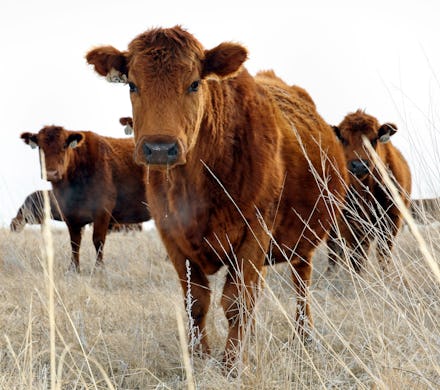Vegetarians May Be The Best Weapon Against One of Our Generation's Biggest Threats

Want to address climate change, but don't trust governments to take on the problem? You have one option that may help: Go vegetarian.
A new study published in the journal Climatic Change determined the difference in greenhouse gas emissions from 55,000 meat eaters, fish eaters, vegetarians and vegans in the United Kingdom. Vegetarians accounted for much less CO2 than meat eaters, while vegans did even better: They accounted for half the emissions that meat eaters did.
Image Credit: Climatic Change
Vegans accounted for about 2.89 kilograms of carbon dioxide per 2,000 kilocalories consumed, much less than 5.63 kilograms of CO2 from medium meat eaters (and the 7.19 kilograms from high meat eaters). Vegetarians and fish eaters were similar, measuring in at 3.81 and 3.91 kilograms of CO2 respectively.
Why the difference? Greenhouse gas emissions come at every level of agriculture, from farming to transportation and storage. In total, agriculture accounts for 14% of global emissions.
Image Credit: EPA
Meat tends to produce much more emissions than growing plants. That's thanks in large part to livestock methane emissions and the inefficiency inherent in raising animals. (You need to grow, transport and store food for the animals and then raise, transport and store the meat from the animals themselves.)
An earlier study found that adjusting farming practices, including raising and consuming less meat, could produce up to a 90% drop in agricultural emissions.
What you can do: If everyone in the U.S. went vegetarian, it would be the equivalent of taking 46 million cars off the road. Take a quick glance at the barbecues going on July 4th, though, and you'll know that's easier said than done.
In a 2012 study, 5% of Americans considered themselves vegetarian, while 2% considered themselves vegan. Worldwide counts are harder to get, though it's estimated that 70% of the world's vegetarians live in India.
Smaller dietary changes can still help, while letting you still eat your favorite burger now and then. According to the Environmental Working Group, eating one less burger a week is like taking your car of the road for 320 miles, while having a four-person family skip meat and cheese one day a week is like taking your car off the road for five weeks.
If everyone in the U.S. took one day a week to not eat meat or cheese, it would be like taking 7.6 million cars off the road.
So your vegetarian and vegan friends are right, they really are helping them environment. Just don't tell them that at dinner, or you'll never hear the end of it.